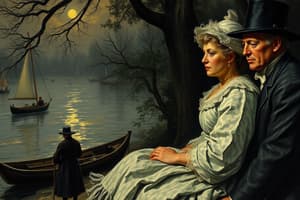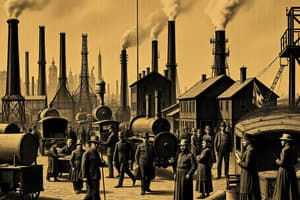Podcast
Questions and Answers
What are Old Immigrants?
What are Old Immigrants?
- Immigrants who migrated to the US from Asia.
- Immigrants who migrated to the US before the 1880s from Britain and Germany. (correct)
- Immigrants who migrated to the US after the 1880s from Southern Europe.
- Immigrants who emigrated to America after the Civil War.
What are New Immigrants?
What are New Immigrants?
- Immigrants who settled in rural areas.
- Immigrants who migrated to the US primarily during and after the 1880s. (correct)
- Immigrants arriving in the US before the Civil War.
- Immigrants who migrated to the US primarily from Northern Europe.
What is an ethnic enclave?
What is an ethnic enclave?
A place with a high concentration of an ethnic group.
What are push factors?
What are push factors?
What are pull factors?
What are pull factors?
What was the Chinese Exclusion Act?
What was the Chinese Exclusion Act?
What was Ellis Island?
What was Ellis Island?
What was the Immigration Restriction League?
What was the Immigration Restriction League?
What were settlement houses?
What were settlement houses?
Study Notes
Immigration in the Gilded Age
-
Old Immigrants: Refers to immigrants arriving in the U.S. before the 1880s, primarily from Northern Europe, including Britain, Germany, and Ireland. They continued to emigrate in significant numbers during the Gilded Age.
-
New Immigrants: These immigrants arrived mainly in the U.S. during and after the 1880s, predominantly from Southern and Eastern Europe, adding to the already established immigrant population without replacing it.
-
Ethnic Enclaves: High concentrations of distinct ethnic groups found in urban areas, such as "Chinatown" and "Little Italy" in cities like New York and Chicago, allowing immigrants to maintain cultural identities.
Factors Influencing Migration
-
Push Factors: Conditions prompting migration, including harsh climates, economic downturns, political instability, warfare, and oppression, motivating people to leave their home countries.
-
Pull Factors: Attractive aspects of potential new locales, such as job availability, political stability, freedom, rule of law, and peace, which encourage individuals to move to the U.S.
Legislative and Social Developments
-
Chinese Exclusion Act (1882): Landmark federal legislation that prohibited Chinese contract laborers from entering the U.S., marking the first instance of immigration bans based on nationality.
-
Ellis Island: Opened in 1892, this immigrant receiving station served as a key entry point in New York Harbor, conducting medical examinations and screenings, symbolizing a welcoming immigration policy.
-
Immigration Restriction League: Founded in 1894 by nativist advocates, this group sought to limit immigration to preferred populations, leading to proposals for literacy tests, which faced several presidential vetoes before being enacted in 1917.
Social Support for Immigrants
- Settlement Houses: Initiatives by progressive reformers aimed at aiding impoverished city dwellers, often targeting immigrant populations. Hull House, established by Jane Addams in 1889 in Chicago, was the first, providing English lessons, citizenship classes, and training in domestic skills.
Studying That Suits You
Use AI to generate personalized quizzes and flashcards to suit your learning preferences.
Description
Test your knowledge on the concepts of 'Old Immigrants' and 'New Immigrants' during the Gilded Age. These flashcards provide key definitions to help you understand the waves of immigration that shaped American society. Perfect for students of American history.




